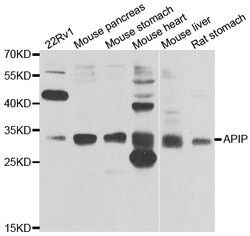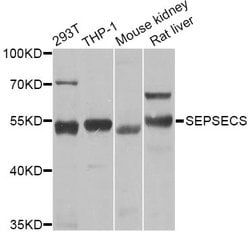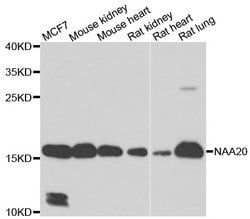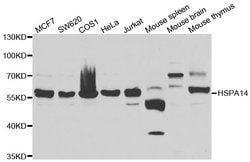APIP Polyclonal Antibody, Invitrogen™
Manufacturer: Thermo Scientific
Select a Size
| Pack Size | SKU | Availability | Price |
|---|---|---|---|
| Each of 1 | PIPA577133-Each-of-1 | In Stock | ₹ 49,528.50 |
PIPA577133 - Each of 1
In Stock
Quantity
1
Base Price: ₹ 49,528.50
GST (18%): ₹ 8,915.13
Total Price: ₹ 58,443.63
Antigen
APIP
Classification
Polyclonal
Conjugate
Unconjugated
Gene
APIP
Gene Alias
APAF1 interacting protein; APAF1-interacting protein; APIP; APIP2; CG129; CGI29; CGI-29; dJ179L10.2; hAPIP; Methylthioribulose-1-phosphate dehydratase; Mmrp19; monocyte macrophage 19; monocyte/macrophage protein 19; MTRu-1-P dehydratase; probable methylthioribulose-1-phosphate dehydratase; RGD1564562
Host Species
Rabbit
Purification Method
Antigen affinity chromatography
Regulatory Status
RUO
Gene ID (Entrez)
295961, 51074, 56369
Content And Storage
Store at 4°C short term. For long term storage, store at -20°C, avoiding freeze/thaw cycles.
Form
Liquid
Applications
Immunohistochemistry, Western Blot
Concentration
1 mg/mL
Formulation
PBS with 50% glycerol and 0.02% sodium azide
Gene Accession No.
Q96GX9, Q9WVQ5
Gene Symbols
APIP
Immunogen
Recombinant full length Human APIP.
Quantity
100 μL
Primary or Secondary
Primary
Target Species
Human, Mouse, Rat
Product Type
Antibody
Isotype
IgG
Description
- The antibody was affinity-purified from rabbit antiserum by affinity-chromatography using epitope-specific immunogen and the purity is > 95% (by SDS-PAGE)
- The mammalian homologues of the key cell death gene CED-4 in C
- elegans has been identified recently from human and mouse and designated Apaf 1 (for apoptosis protease-activating factor 1)
- Apaf 1 binds to cytochrome c (Apaf 2) and Caspase-9 (Apaf 3), which leads to Caspase-9 activation
- Activated Caspase-9 in turn cleaves and activates Caspase-3 that is one of the key proteases, being responsible for the proteolytic cleavage of many key proteins in apoptosis
- Recently, Cho et al (4) have identified a new Apaf 1 Interactiong Protein (APIP) also known as CG129 and MMRP19, as a negative regulator of ischemic injury
- APIP competes with Caspase-9 binding site of Apaf 1
- APIP is predicted to code for a 204 amino acid
- An isoform of APIP, APIP2 encodes a 242 amino acid protein, which is an alternative splicing variant differing in its N-terminus from APIP
- APIP transcript is ubiquitously expressed in most adult tissue with high expression in skeletal muscle, heart, and kidney.



